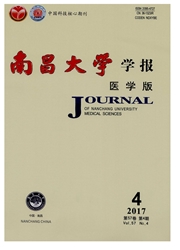

 中文摘要:
中文摘要:
目的研究苦参碱(Matrine)对人胃癌多药耐药细胞株SGC7901/VCR的多药耐药的逆转效应及其机制。方法以长春新碱(VCR)诱导的人胃癌多药耐药细胞株SGC7901/VCR为研究对象,MTT法研究苦参碱对体外培养的人胃癌多药耐药细胞株SGC7901/VCR细胞增殖的影响及逆转效应、用间接免疫荧光法经流式细胞仪检测MRP的表达并分析其机制。结果 MTT法显示苦参碱在0.5、1.0、2.0 mg.mL-1浓度下处理SGC7901/VCR细胞72 h后,其生长抑制率依次为10%、15%、32%,且可以逆转SGC7901/VCR对VCR的耐药,呈剂量依赖性,逆转倍数分别为9.4、13.4、24.5倍。0.5 mg.mL-1苦参碱与SGC7901/VCR细胞共同培养24 h后,SGC7901/VCR细胞的MRP表达从(36.00±4.32)%降低至(25.00±3.85)%(P〈0.01)。结论苦参碱可以体外逆转人胃癌细胞多药耐药细胞SGC7901/VCR的耐药性,其逆转机制与降低MRP的表达有关。
 英文摘要:
英文摘要:
Objective To explore the reversal effect of matrine on multidrug resistance(MDR) in drug-resistant human gastric cancer cell line SGC7901/VCR and its mechanism.Methods The reversal effect of matrine on proliferation of multidrug-resistant SGC7901/VCR cells was determined by using MTT assay,and the expression of MDR-associated protein(MRP) in human gastric cancer cells was detected by flow cytometry.Results The growth inhibition rates of SGC7901/VCR cells were 10%,15% and 32% after 72 hours of treatment with matrine at concentrations of 0.5,1,and 2 mg·mL-1,with reversal of 9.4,13.4,24.5 fold,respectively.The expression of MRP was decreased from(36.00±4.32)% to(25.00±3.85)% after 24 hours of treatment with 0.5ug/mL matrine(P0.01).Conclusion Matrine can reverse MDR of human gastric cancer cell line SGC7901/VCR in part by a mechanism involving decrease of MRP expression.
 同期刊论文项目
同期刊论文项目
 同项目期刊论文
同项目期刊论文
 期刊信息
期刊信息
